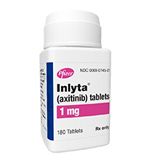Axitinib Fails to Meet Primary Endpoint in Treatment-Naive RCC
In mid-October, Pfizer announced that its phase III study being conducted examining axitinib (Inlyta) in treatment-naive patients with advanced renal cell carcinoma failed to meet its primary endpoint of improving progression-free survival compared with sorafenib.
In mid-October, Pfizer announced that its phase III study being conducted examining axitinib (Inlyta) in treatment-naive patients with advanced renal cell carcinoma failed to meet its primary endpoint of improving progression-free survival compared with sorafenib.

The results were from the AGILE 1051 trial, which included 280 treatment-naive patients with advanced renal cell carcinoma. The trial was powered to show a 78% improvement in progression-free survival benefit with axitinib compared with sorafenib.
The announcement, published on Pfizer Pharmaceutical News and Media, said that “a preliminary review of the data showed that overall the median progression-free survival for [axitinib] exceeded the median progression-free survival for sorafenib, but did not meet statistical significance.”
However, a pre-specified subgroup analysis of patients classified as having good performance status showed that axitinib exceeded the median progression-free survival for sorafenib.
“We are analyzing the study findings to determine whether further evaluation of [axitinib] in specific subpopulations of treatment-naive patients with advanced renal cell carcinoma would be warranted,” Mace Rothenberg, MD, senior vice president of clinical development and medical affairs for Pfizer’s Oncology Business Unit, said in a press release.
In January, axitinib was approved by the FDA for the treatment of advanced renal cell carcinoma after failure of one prior systemic therapy. At that time, it became the seventh drug approved for renal cancer in 7 years.
At the 2012 annual meeting of the American Society of Clinical Oncology (ASCO) held in June, Brian I. Rini, MD, of Cleveland Clinic Taussig Cancer Center, presented results of a phase II retrospective trial that also examined the effects of axitinib in patients with metastatic renal cell cancer who had not been previously treated in a metastatic setting. The results showed that patients who achieved high drug exposure to axitinib had a longer progression-free survival and greater response rate compared with those who did not receive a titrated dose of the drug.
When asked about the implications of the announcement about Pfizer’s trial, Rini said that it is “too early to say because we do not have any details on the trial.”
“Pending the final results of both trials, we will try to make an assessment of the drug and see if it has any value in these patients,” Rini said. “It is hard to say right now though.”
Dr. Rini has done consulting work and received research funding from Pfizer.